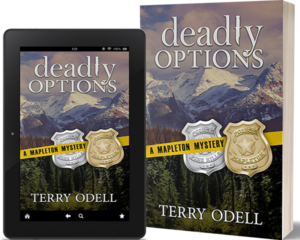Enough Already
Terry Odell
 I talked about repetition in my last post. Today, another peeve along similar lines, triggered by the same author that bugged me enough to write that previous post. I understand (and agree) that sometimes telling is more efficient than showing. But how much? While I can understand an author’s desire to make sure the reader understands background, I’m not fond of his technique, which is to step in as the author and provide details that don’t seem worth stopping forward motion.
I talked about repetition in my last post. Today, another peeve along similar lines, triggered by the same author that bugged me enough to write that previous post. I understand (and agree) that sometimes telling is more efficient than showing. But how much? While I can understand an author’s desire to make sure the reader understands background, I’m not fond of his technique, which is to step in as the author and provide details that don’t seem worth stopping forward motion.
Michael Connelly feeds in background, but it never pulls me out of the story. This author, also writing a police procedural, isn’t pulling it off as well.
The two cops in the story—typical detective tropes: old, fat, donut eating guy just counting down to retirement, and the young, attractive female, recently promoted to detective—answer a call to a home where a neighbor says she saw blood. The cops take a look, and the newbie says, “Exigent circumstances?” Now, both cops know what this means, but the author decides to spend a paragraph explaining it. If the author wants to show the reader, why not have one of the cops explain it to the neighbor who wants to know why they’re not rushing right in?
Then there’s stopping the story for reflection. Two cops looking into a possible murder scene. Is this the time for one of them to reflect on what her siblings dressed up as on Halloween? And do we need to know the ages of those siblings? Is it important? Maybe. Is it important now? I don’t think so. Skimming right along.
Given the possible victims have connections to the movie industry, one of the witnesses mentions a possible suspect who’s a grip. She very nicely explains that a grip “moves lights and carries stuff on movie sets.”
That’s fine. Makes sense for her to explain it to the cops, but then the author takes us on another trip down memory lane while the rookie cop reflects on a family member who was also a grip, and how he was related, how often he visited, and what he brought them for Christmas. I’d call this a “stay in the phone booth with the gorilla” moment.
Details about what kind of magnets are holding up what kind of artwork on the fridge don’t move the story forward. The fact that there’s blood spatter on one of those pieces of art does.
In an attempt to give the readers information, the author has a scene between the rookie detective and the head of the Crime Scene Unit. It’s clear the author has researched the subject and wants to make sure readers know it, but how many readers care that the techs test stains they think are blood with tetramethylbenzidine? Just “We ran a test to confirm they’re blood” would probably work for 90% of readers. And do I want to know that they used HemDirect to tell if the blood was animal or human? Again, a simple “We determined the blood was human” would probably be sufficient. And this type of conversation went on and on for the entire chapter. We see the rookie detective using her knowledge, but her thoughts seem to be on the page as a way to explain—or over-explain—things for the reader. Or, worse, showcase the author’s research. Research should be like pepper. You don’t want to overwhelm the dish.
I’m also bothered by a lot of the roadmap descriptions. I don’t really care what street a sheriff’s station is on, or that the street runs alongside the southern edge of the 101 freeway. I’m direction-challenged, so telling me a hotel is seventy miles north of Los Angeles (even through I grew up there) doesn’t add anything. It makes me stop and try to imagine a map, thus pulling me out of the story. Unless you’re familiar with the city, seeing the turn-by-turn route a character takes won’t add anything to the story. Going into detail about how long it would take to get from point A to point B in varying traffic conditions, unless there’s a plot-related reason is just another speed bump. Even the Hubster, who has a much higher tolerance level for things that bother me, complained about the overdone roadmap scenes.
Where do you draw the line between description and info dumping? Genre matters, of course, but in commercial fiction, especially mysteries, thrillers, and action-adventure, too much might be as bad as too little.
Terry Odell is an award-winning author of Mystery and Romantic Suspense, although she prefers to think of them all as “Mysteries with Relationships.” Follow her on Facebook and Twitter.

Are Gordon’s Days in Mapleton Numbered?
Deadly Options, a Mapleton Mystery/Pine Hills Police crossover.
